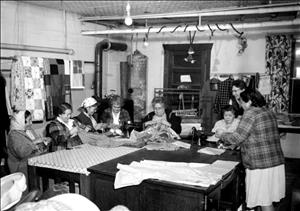On July 20, 1992, the Tulalip Casino opens with 23 gambling stations for blackjack, craps, roulette, and poker. A maximum wager at 13 tables is set at $10 and at the remaining tables $15. Slot machines are prohibited. The Tulalips are the second tribe in Washington state to open a casino following the 1988 federal ruling allowing reservation gambling.
A New Direction
When the Tulalip Tribes called their first letters and numbers at the Tulalip Bingo parlor in June 1983, few would have expected their modest dreams to grow into big casino riches. But when a federal law was passed in 1988 permitting the same types of gambling on reservations as was permitted elsewhere in the state, Tulalip leaders were quick to develop plans for a casino.
For generations regional tribes had been fishing people, but by the 1960s most were leaving the reservations in search of work. By the 1990s, competition in the fishing business left most Indians struggling to survive. It was not uncommon for a tribal fisherman to clear under $3,000 in yearly profit. Before the casino opened, 60 percent of Tulalips were on welfare.
The casino business gave tribes a chance to create reservation jobs at decent wages and to begin developing a middle class. In the long haul, the wealth was great enough to spread to the neighboring community of Marysville and to county nonprofit groups through the Tribes' charitable giving program.
The Lummi Tribe opened its casino in February 1992, beating the Tulalips by five months. Five years later there were 10 reservation casinos in Washington state. But a Gambling Commission report in 1997 picked only two as having large revenues -- the Muckleshoots and the Tulalips. Although many of the smaller casinos provide jobs for their members, most make only marginal profits.
Tulalip Casino Riches
The Tulalip Tribes used their new wealth to build buildings, expand education, medical and dental services, and to grow their investments. They also began purchasing back 4,000 acres of reservation land that they had sold over past decades. The Tribes presently own more than half of their 22,086-acre reservation. Their charitable giving program began, offering grants to county non-profit organizations.
Fears that gambling would bring organized crime to the Res did not materialize, since the Tulalip Tribes fully own and maintain their operation. In 1994 convictions of cheating led to misdemeanor charges for seven blackjack dealers. The dealers were fired and the public was assured that security systems do not allow that kind of thing to happen for long.
When the casino opened in 1992, Stan Jones (1926-2019), Tribal Chairman at that time, told the media, “The Casino was really a godsend. Without the casino, we would have been starving” (The Seattle Times, June 3, 1992).

